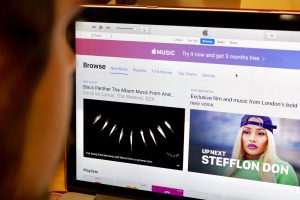By Sean Franklin

This week, The Wall Street Journal reported that Apple Music was on track to overtake Spotify in U.S. subscriptions. Apple Music’s American subscriber base has been growing at about five percent a month, while Spotify’s growth sits at two percent. When I first read this, I was very surprised. Almost all of my friends use Spotify. I know almost no one who uses Apple Music – the idea that there are about to be more Apple Music than Spotify users seemed crazy to me. The people I do know who use it are mostly older people in my parents’ generation or people who are on their parents’ family plans.
This got me thinking. Why are older, less tech-savvy people using Apple Music as their streaming service of choice? After I pondered it for a little while, the answer seemed clear.
The main advantage that Apple Music has over Spotify is that it’s baked into the Apple ecosystem. If you buy an iPhone, Apple Music is preinstalled as part of the Music app. I remember the days when the Music app was just for the music that you had downloaded to your phone. Now, all of your own music is packed into one tab, while the other four are for Apple Music and related services.
It’s unavoidable. Even if you want to use the Music app just to listen to your own music, Apple is subtly nudging you towards Apple Music by making it the main focus. Less informed iPhone owners might not know about Spotify, but they’ll know about Apple Music because it’s already on their phones when they buy them. I think the fact that Apple Music comes preinstalled on every iPhone is the only way to explain its rapid growth rate. Apple Music and Spotify are very similar services. They both cost the same – $9.99 a month. They both offer a free trial of sorts – Apple Music has a three-month trial period, while Spotify offers free usage indefinitely, albeit with ads.
They both offer you unlimited access to a massive library of music, and they’re both available on iPhone, Android, PC and Mac. There’s really no way to objectively justify Apple Music’s much higher growth rate. Something else must be going on. That something else is what anti-trust law calls “anti-competitive practices.” Apple Music is not gaining ground because it’s a better service than Spotify, it’s gaining ground because Apple is giving it an unfair advantage by bundling it with every iPhone. This whole situation is very reminiscent of something that Microsoft did in the 1990s, something that eventually led to a lawsuit by the Department of Justice. Microsoft was accused of abusing its monopolistic power by bundling Internet Explorer, its own web browser, with every copy of Windows crowding out competition from other web browsers, like Netscape.
The DOJ ruled that Microsoft had abused its dominant position in the software industry to give Internet Explorer an unfair advantage over its rivals, and a federal judge ruled that the company should be split up. Microsoft narrowly escaped a breakup by appealing its case, but penalties were still imposed to make sure that they couldn’t use their position to game the market. Apple is doing something very similar with Apple Music. By bundling it with every iPhone they sells, the company is giving it an unfair leg up over its competitors. This isn’t even the first time that Apple has done this. Google Maps used to be the dominant navigation app on iPhones, but then Apple started preinstalling Apple Maps. Even more insidious is iMessage, which is built on top of the texting app and engages automatically when Apple sees you texting a phone number that’s associated with an iPhone.
Ever wonder why no one on iPhone uses WhatsApp? It’s because iMessage is built in – why bother downloading another messaging service when you can just use the one that Apple put there? Apple is no stranger to anti-competitive practices. In fact, it’s been doing it for years. In this age of increasing monopolization in the tech industry, trustbusters should be especially vigilant for this kind of behavior. It is far too easy for an Apple, a Google or an Amazon to abuse the dominant position that they’re in. Microsoft wasn’t allowed to get away with it, and Apple shouldn’t either. Competition is the soul of the market, and if companies try to stifle it, they should be punished accordingly.
Sean Franklin, FCRH ‘21, is an urban studies major from Alexandria, Virginia.


































































































































































































